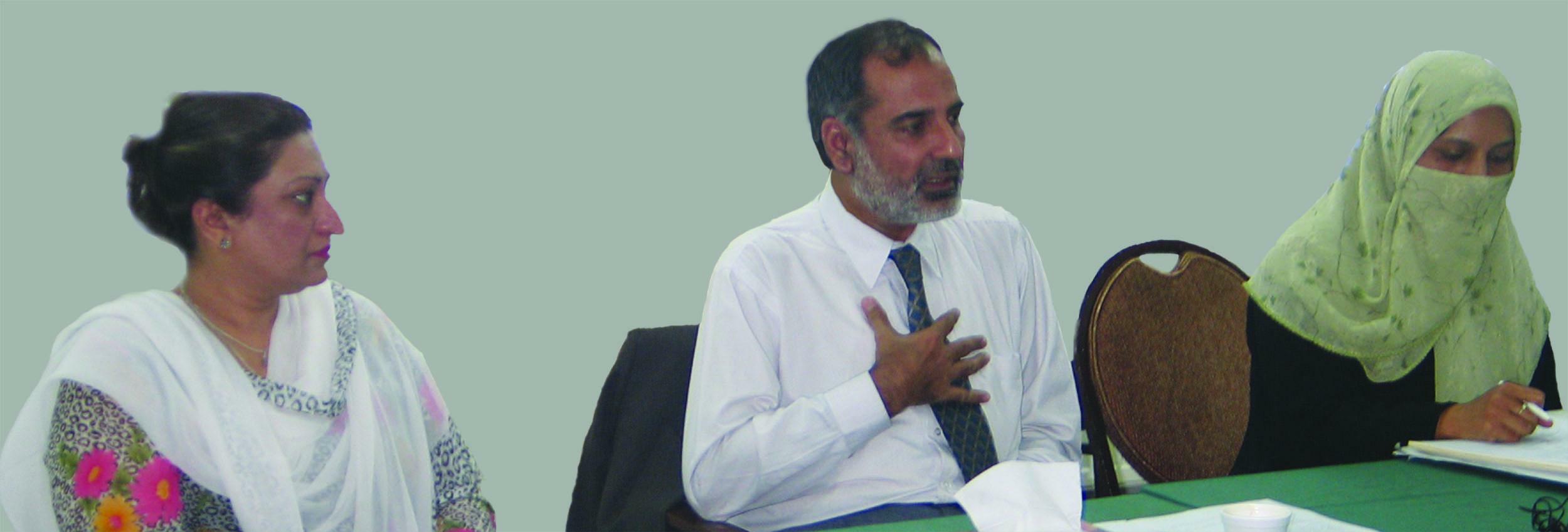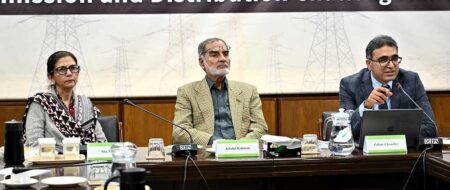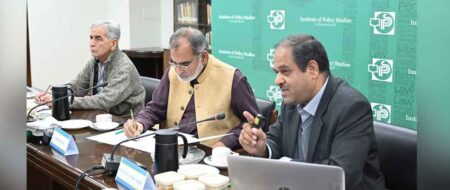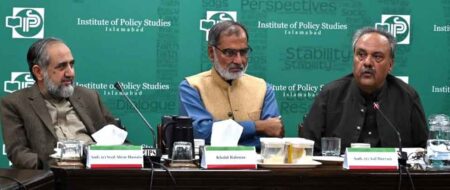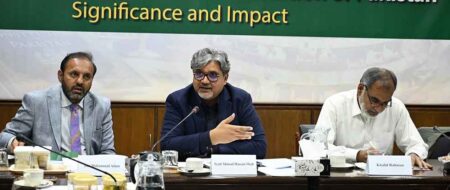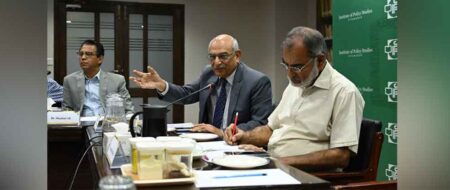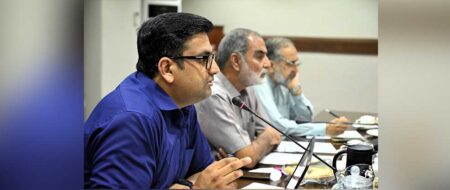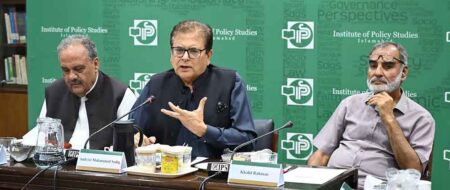In the first meeting of the SGGI Working Group on ‘Women & Media’ Director General IPS, Khalid Rahman, welcomed the participants and thanked them for being part of the working group. Mr. Rahman introduced the group as well as its vision and objectives. He said that media was influencing life on earth at individual as well as global level. Media is being used as a strategic tool and for social and political purposes.
In the first meeting of the {yootooltip title=[SGGI] sticky=[1] width=[400]}
SGGI IPS has undertaken themes relating women in society since its inception and a number of studies and publications followed in subsequent years. The subject later became a major focus in IPS when a Study Group on Gender Issues (SGGI) was established in 2001. The objective was to benefit from the knowledge, expertise and experiences of persons with different backgrounds and various fields of activity. The group prepared reports on institution of family, education and economy. For certain operational reasons, there was a break in proceedings of the Group for sometime.{/yootooltip} – Working Group on ‘Women & Media’ Director General IPS,
Khalid Rahman , welcomed the participants and thanked them for being part of the working group.
Mr. Rahman introduced the group as well as its vision and objectives. He said that media was influencing life on earth at individual as well as global level. Media is being used as a strategic tool and for social and political purposes.
He further mentioned that portrayal and exploitation of women in media was a common concern for feminist as well as traditionalist reformers and the group is expected to assess and analyze the real situation and come up with principles as well as practical suggestions addressing different stake holders. Forms of the contribution of the group might vary from developing a greater understanding of the issues, to advocacy and generating public awareness or proposing legislation.
He reiterated that the thought process in the group will not be motivated by any imported or imposed agenda but will use the local culture, common belief, domestic needs and indigenous value framework as its yardstick. Ultimate objective of the whole exercise was restated to be establishment of an ideal society through strengthening of family institution.
Members of the working-group introduced themselves and mentioned their respective interests and expertise in the subject. It was noted that the group, despite its smaller size, reflected diversity as well as profundity.
Proposed outline prepared by
Mr. Irfan Shahzad was then put forth for the discussion and suggestions.
Participants appreciated the underlying idea and said that Western societies too have started to realize that institution of family needed to be reinforced. Satisfaction was expressed over the approach adopted in the preamble of the proposed outline.
It was noted that media had been successful in promoting awareness among the masses. Some members felt that women were playing vibrant role in all sections of media. More and more women were opting to study mass communication and their number has already exceeded men in many institutions. Ratio of female columnists, too, is gradually and swiftly increasing. Participation of females in E-Media had shown even swifter surge and they were using their expertise in all relevant departments, including those involving decision making.
This observation was, however, contested by other members who felt that Beijing Platform for Action had seen the portrayal of women as one of the most critical areas of concern. It was highlighted that the current debate on the issue had primarily focused on the portrayal while neglecting participation of women in media. Not only a balanced and positive portrayal of women in media but also their involvement in decision making has to be promoted without compromising on merit. It was contended that despite more visibility of women in media in different capacities, women at executive were very few. It was argued that despite an increase in the number of women involved in production and ideas generating like media blogging, they were mostly confined to modeling, acting and soft journalism.

It was also mentioned that there was no effective official mechanism to check and control the quality of programs being presented by the media but public conscience was proving a useful and efficiently used tool for the media to regulate itself, which could be termed as a positive sign. It was stressed that Media literacy needed to be increased so that a viewer or reader could critically analyze the stuff being presented.
Some members were also of the view that the subject and contents of ‘Gender Issue’ were borrowed from the West. It was maintained that even if cultural dimension of the debate was overlooked, Pakistani society was fundamentally different from the Western societies. Economic opportunities were not available even to males who were primarily supposed to earn bread; provision of such opportunities, therefore, seemed more like wishful thinking. Proper utilization of capabilities of each person was more important than provision of jobs to women in some petty jobs in factories and offices.

Working environment in media organizations also came under discussion and it was stressed that media practitioners should also be trained to be gender sensitive. Media organizations needed to maintain balanced environment through adoption and proper application of an effective code of conduct at workplace, which not only shows professionalism and cooperation but also keep societal values. Such steps would, it was argued, encourage women to join the media at all levels and in more constructive positions. Our media is presenting women merely as nurturer or victim or object and not as thinker or leader.
Members deplored that most of the programs being telecast by Pakistani channels were projecting foreign culture and stressed the need to set guidelines that could help the media in formulating their programs in consistence with our national culture and values.
It was however underscored the group needs to explore ways and means for influencing the stakeholders and define a strategy to be able to more effectively approach them with cognitive and practical suggestions.
Discussion evolved two dimensions of the topic: women working in media and women being used as object in media. Serious concern was shown on use of women as object in advertisements, talk shows and even in news. It was also noted that media was using women to raise human rights issues by showing them with exaggeration as victims, while it is fundamentally an outcome of the poor governance. As is well known that men, too in our society are victimized and exploited as were women but specifically projecting downtrodden and oppressed females was portraying negative image of Islam. This was termed wrong depiction of real situation in our society.
It was also agreed that women too should resist such portrayal and should not remain available for their use as an object for political, economic, social, and even religious interests of others. It was regrettably pointed out that our media did not feel hesitant in showing the faces and identity of ladies who were victims of some crime, while in other countries even the faces of criminal were not opened on screen.
Concluding the session
Mr. Rahman explained various levels of activity for actual change at the end of group’s activity as:
(1) direct initiatives at their respective places by the group members;(2) increasing awareness; and (3) proposing and more ideally drafting some necessary legislation on the subject. He said that outcome of the study may be shaped for specific groups in society like religious scholars, NGOs and lawyer community etc.
Ms. Shazia Haris was selected as the chairperson of the group.
Wednesday, April 29, 2009
 It was also mentioned that there was no effective official mechanism to check and control the quality of programs being presented by the media but public conscience was proving a useful and efficiently used tool for the media to regulate itself, which could be termed as a positive sign. It was stressed that Media literacy needed to be increased so that a viewer or reader could critically analyze the stuff being presented.
It was also mentioned that there was no effective official mechanism to check and control the quality of programs being presented by the media but public conscience was proving a useful and efficiently used tool for the media to regulate itself, which could be termed as a positive sign. It was stressed that Media literacy needed to be increased so that a viewer or reader could critically analyze the stuff being presented. Working environment in media organizations also came under discussion and it was stressed that media practitioners should also be trained to be gender sensitive. Media organizations needed to maintain balanced environment through adoption and proper application of an effective code of conduct at workplace, which not only shows professionalism and cooperation but also keep societal values. Such steps would, it was argued, encourage women to join the media at all levels and in more constructive positions. Our media is presenting women merely as nurturer or victim or object and not as thinker or leader.
Working environment in media organizations also came under discussion and it was stressed that media practitioners should also be trained to be gender sensitive. Media organizations needed to maintain balanced environment through adoption and proper application of an effective code of conduct at workplace, which not only shows professionalism and cooperation but also keep societal values. Such steps would, it was argued, encourage women to join the media at all levels and in more constructive positions. Our media is presenting women merely as nurturer or victim or object and not as thinker or leader.

